Affiliate marketing is one of the most popular ways to make money online? But does it really work? And is it a good fit for you? Read on to find out!
Key takeaways
- Affiliate marketing requires 1-3 years of consistent effort before generating substantial income.
- Subject-matter expertise and an existing audience give you a significant competitive advantage in affiliate marketing.
- Only promote products you actually use—authentic reviews build trust and long-term success.
You’ve watched a YouTube video or read a blog post where someone claims they’re making thousands of dollars a day in passive income from affiliate marketing.
So, naturally, you’re wondering: Does affiliate marketing work?
Yes, it does — but not for everyone.
Read on to learn how affiliate marketing works and whether it’s a good fit for you. Plus we’ll share some of our favorite examples of high-performing affiliate marketers.
How does affiliate marketing work?
Affiliate marketing is a revenue-sharing model involving three parties:
| Who They Are | What They Do |
|---|---|
| Brand or retailer (AKA advertiser) | Run an affiliate program that pays affiliate publishers a commission for specific actions (like generating leads or sales) |
| Affiliate marketer (AKA publisher) | Promote the advertiser's products and services through channels like blogging, social media, and email marketing |
| Customer | Reads/watches the affiliate publisher's content then performs the desired action (like buying a product or filling in a lead capture form) |
It’s all made possible through the magic of affiliate linking.
Affiliate links are links that affiliate marketers can generate after joining an affiliate program. They contain unique URL parameters that help affiliate advertisers track where their traffic and sales come from — ensuring they pay commissions to the right person.
When the affiliate marketer mentions an affiliate product or service in their content, they add their affiliate link, just like this example from the affiliate website Cats.com:

Every time someone clicks that link and buys something, Cats.com earns a commission — typically either a percentage of the transaction value or a fixed cash sum.
So the mechanics of affiliate marketing are relatively simple:
- Find and join a decent affiliate program
- Create content around the advertiser’s products or services
- Add your affiliate links
- Profit
Of course, nothing’s ever that easy. If it was, everyone would be making bank as an affiliate publisher.
In reality, successful affiliates tend to share a few common traits. We’ll discuss them in the next section…
When does affiliate marketing make sense?
There are no guarantees in affiliate marketing. But you’ll have the best chance of success if you tick one (or more) of the following boxes:
You’re a subject-matter expert
You need to answer one simple question if you’re going to succeed in affiliate marketing: “Why should I listen to your recommendations?”
We live in a world that’s overflowing with content. Swing your carry-on luggage next time you’re on a flight and you’re practically guaranteed to hit half-a-dozen influencers. With so many so-called “experts” out there, people will only sit up and pay attention if you’re the real deal.
To be clear, we’re not saying you need a PhD in computer science to write about the best laptops under $500.
But you should be able to demonstrate some amount of subject-matter expertise. Maybe you:
- Work in your chosen niche
- Studied it in college
- Are a long-standing hobbyist
For example, travel blogger and affiliate marketer The Blonde Abroad backs up her wanderlust credentials by revealing she’s visited 70+ countries:

So when she gives travel recommendations — like the best accommodations in Mo’orea or the safest destinations for solo female travelers — you trust that she knows her stuff.
This means there’s a good chance you’ll click her affiliate links and buy whatever she’s promoting.
And that’s not the only reason to highlight your expertise; it can also help you generate more traffic through SEO. A couple of years ago, Google rolled out its E-E-A-T quality rater guidelines, under which content is evaluated for:
- Experience
- Expertise
- Authoritativeness
- Trustworthiness
In other words: if you can persuade Google that you know what you’re talking about, it’s more likely to surface your content in relevant search results.
You’ve already built an engaged following
Arguably the hardest thing about affiliate marketing is building an audience.
Because, as we’ve noted, there are a ton of other content creators out there — and cutting through the noise is tough.
So you’ll have a big headstart over other would-be affiliates if you’ve already got a bunch of people hanging on your every word through one of the following methods:
- A website or blog generating consistent traffic through SEO, paid ads, social media, or other channels.
- A social media platform, especially one people use to find product/service recommendations, like Instagram, TikTok, and YouTube.
- An email newsletter with at least a couple hundred subscribers and a high open rate.
- An online community, like a chat forum or Facebook Group.
- A podcast in a niche that aligns with your affiliate marketing strategy.
That’s not to say you’ll definitely crash and burn if you don’t already have a big online audience. After all, a journey of 1,000 miles begins with a single step. It’ll just require more work upfront before you start seeing a return.
You use the products/services you’re promoting
The previous two points are nice-to-haves. Plenty of affiliates have become successful despite having zero expertise and no existing audience.
But this one is essential.
The whole reason people look for recommendations online is to hear from someone who already owns and understands the thing they’re interested in. So if you’re going to create content about an affiliate product or service, you’d better have spent enough time using it to form a valid opinion.
People aren’t stupid. It’ll be obvious if you’ve never tried the product yourself, because your content will sound generic. Your readers, viewers, or listeners are searching for an honest, authentic review — not a description ripped straight from a product page.
Actually owning the product also makes it way easier to create original, informative content. And The Algorithm loves original, informative content.
Pro tip: When you put the work in, make sure your audience knows about it by picturing yourself with the product. Just like Fay Doyle, founder and editor-in-chief of This Expansive Adventure, did in this article about the best trekking poles:
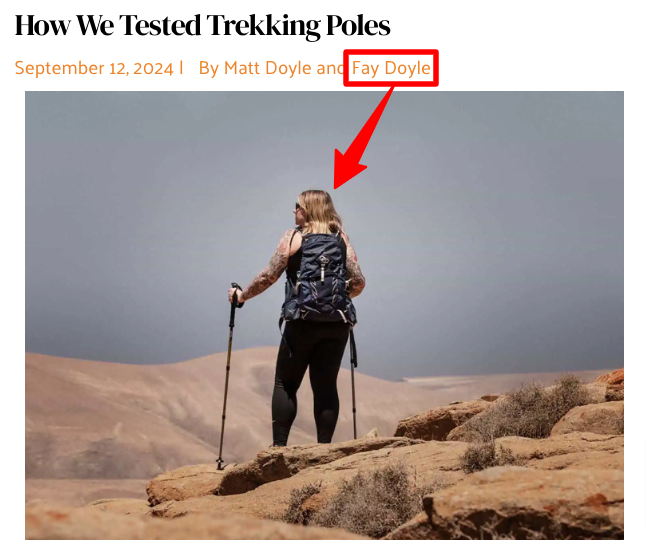
You’re comfortable on camera
Again, this one isn’t necessarily essential. Some successful affiliates prefer to remain behind the scenes. But if you’re going to promote products on visual platforms like Instagram, TikTok, and YouTube, you need to be comfortable in front of the camera.
Bear in mind that over four-fifths of people say they’ve been persuaded to buy a product or service by watching a video.
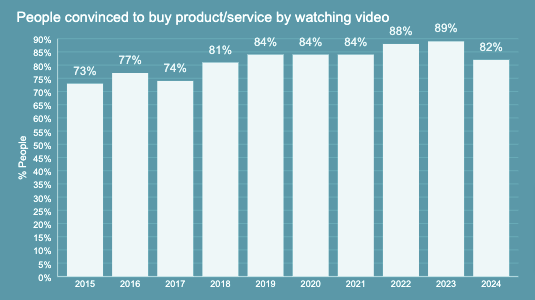
So even if you’re a total n00b at reviewing products on camera, I’d suggest at least giving it a try. Who knows? You might be a natural.
Your niche has a large audience
In the early days of affiliate marketing, generating traffic, clicks, and sales was a cinch.
Unfortunately, it didn’t take long for huge publishers to wake up to the potential of affiliate marketing. That’s why lots of high-volume, affiliate-friendly searches are now dominated by websites that you just can’t compete with. For example, check out the search engine result page (SERP) for the term “best mattresses”. Even the New York Times only just makes the top #10.
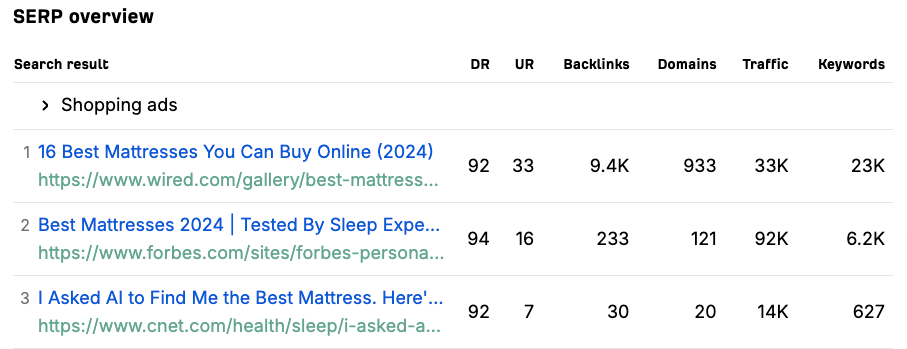
And it’s not much different on social media, where similar searches are dominated by accounts with thousands of followers and millions of likes.
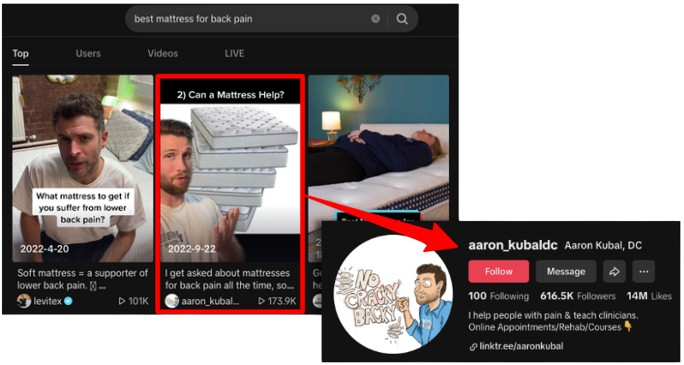
This makes sense given that social platforms prioritize content that already has a ton of engagement.
So you might think it’s a smart move to choose an obscure niche. But in a world where publishers like Forbes cover everything from dog costumes to protein bars, truly obscure niches are hard to come by.
Instead, choose a broad niche with mass appeal, then get more granular. Not only will the competition be lower, but the audience will be more engaged (and ready to buy). For example:
Bad: Fashion
Better: Streetwear
Best: Japanese-inspired streetwear
Your niche has a healthy profit margin
The higher a niche’s profit margin, the more commission you can theoretically earn.
Let’s look at an example from Amazon Associates, the biggest affiliate program on the planet. It only pays a 1% commission on sales of video consoles, because they’re not just expensive to buy — they’re expensive to manufacture, too.
On the flip side, Amazon pays four times more for higher-margin products like watches, luggage, and jewelry:

You shouldn’t pick your affiliate niche based solely on commission rates. But, at the same time, you deserve to be rewarded fairly for the work you put in.
When doesn’t affiliate marketing make sense?
By contrast, affiliate marketing probably won’t work for you if any of the following is true:
You expect to get rich quick
According to one survey, the average affiliate earns a healthy $8,038 per month, or $96k+ per year. But this figure drops to just $636 for those with less than one year of experience. Even affiliates with up to two years of experience are only making $4,196 per month — that’s about $9k a year less than the average US salary.
It’s only at the three-year mark where affiliate earnings really start ramping up:
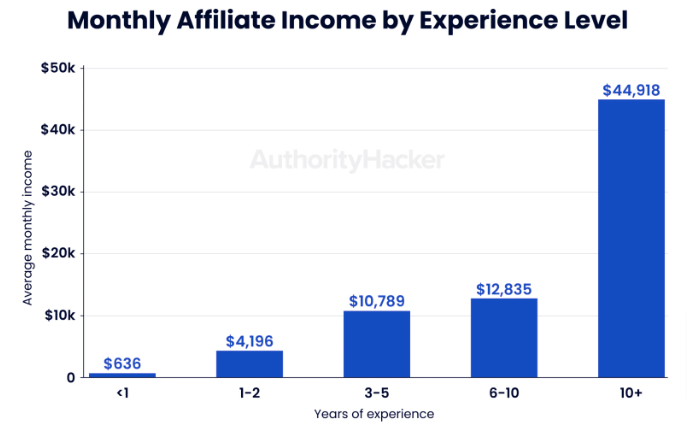
What does this tell us?
That affiliate marketing definitely works — but only if you put the effort in over a prolonged period.
So it isn’t going to make you a millionaire overnight. But neither is any legitimate side hustle or pursuit.
You recommend products based on commissions, not quality
Most affiliate advertisers are legit businesses.
However, just like in any industry, there are some shady folk out there selling low-quality, scammy products. Trouble is, that they often pay sky-high commissions — way above other advertisers in their niche — in a bid to lure naive (or unscrupulous) affiliate publishers.
Promoting these sorts of affiliate offers might earn you some easy money in the short term. But sooner or later, word will get around that you only recommend sucky products.
At this point, your whole affiliate business will crash and burn.
Far better, therefore, to only put your name on products you actually use and trust. Sure, they might not pay the highest commissions, but they’ll be way more profitable in the long run.
You only see your niche as a revenue stream
If you’re looking for a low-stress way to make money, go get a regular office job — they’ll pay you for showing up and staring at a screen all day!
Affiliate marketing can be a whole lot more rewarding than working for The Man. But it ain’t easy.
It might be years before you start earning good money (like, enough to focus on it full-time). And you’ll almost certainly encounter some setbacks along the way.
Realistically, you’re more likely to stick with it if you’re actually interested in and passionate about your chosen affiliate niche.
Affiliate Marketing Pros and Cons
Every business type has its own strengths and weaknesses. In my view, these are the biggest pros and cons of affiliate marketing:
| Pros 👍 | Cons 👎 |
|---|---|
| No need to buy stock or design a product | No control over product development |
| No need to worry about logistics | No control over customer experience |
| Start making money online fast | Affiliate advertisers always earn more than you |
| Easy to scale up | Lots of competition from huge publishers |
Affiliate marketing pros
No need to buy stock or design a product
Some entrepreneurs love the feeling of controlling every element of their business. Whereas others would much rather leave all that stuff to someone else so they can focus on branding and marketing.
If you’re in the second camp, affiliate marketing could be a good fit for you.
Because you’re promoting someone else’s products or services, you only have to think about growing your own audience. There’s nothing too technical to worry about, other than (potentially) building a website.
No need to worry about logistics
From high shipping rates to lost and delayed orders, logistics is a constant headache for ecommerce store owners.
But not for affiliate marketers. Once a customer clicks your affiliate link, your work is done. It’s up to the retailer to take payment and fulfill the order (while you lay back and count your commissions).
Start making money online fast
Precisely because you don’t have to design a product, buy stock, or figure out the logistical side of your business, affiliate marketing has a super low barrier to entry.
All you need is some kind of traffic source, like a blog or social media account. Then you can simply join a bunch of affiliate programs, create promotional content, and add your affiliate links.
If you’ve already built an online audience, you can start making money from affiliate marketing in a matter of minutes.
Easy to scale up
Affiliate marketing is super scalable: to increase your earnings, you just need to create more content so you can generate more traffic and clicks.
Once you start making decent money, you can even hire full-time or freelance content creators to lighten your own workload.
And if you begin to see diminishing returns from your current niche, you can simply expand into other niches.
Affiliate marketing cons
No control over product development
On the other hand, if you’re more of a control freak, you might not enjoy the prospect of selling someone else’s product.
Indeed, you might prefer to find gaps in the market and design something that fits.
You can’t do that with affiliate marketing; the closest you’ll get is choosing which affiliate programs to join.
No control over customer experience
However, having zero involvement in logistics isn’t always a good thing.
If you work with an affiliate advertiser who regularly misses delivery slots or loses packages, it could reflect badly on you. And there’s nothing you can do about it — other than ditch the advertiser and join a different affiliate program.
Affiliate advertisers always earn more than you
While there are plenty of outliers, most affiliate programs pay commission rates of 5% – 30% per sale.
Sure, a 5% cut is better than a kick in the teeth. But the advertiser gets to keep the other 95% (minus any other costs), even though you did all the hard work to attract and convert the customer.
Still, most affiliates consider this a worthwhile trade-off for not having to deal with things like customer support and shipping.
High competition
Because affiliate marketing has such a lower barrier to entry and is so easy to scale, there’s a ton of competition in most niches.
Not just from one-person teams like you, but from major publishers like Forbes and Wired. However many freelancers you hire, you’re never going to outrank those guys.
This highlights the importance of choosing a niche containing plenty of sub-niches. That way, you can hone in on more specific audiences.
The more specific your audience, the easier it becomes to create content that feels personalized to their goals and pain points. Which, in turn, means they’re more likely to convert.
3 Examples of high-performing affiliate marketers
I’ve given you plenty of theories about whether affiliate marketing works. Now, let’s look at some real-life examples of affiliates that have built substantial online audiences and are leveraging them to earn some serious cash from affiliate marketing.
1. Garage Gym Reviews
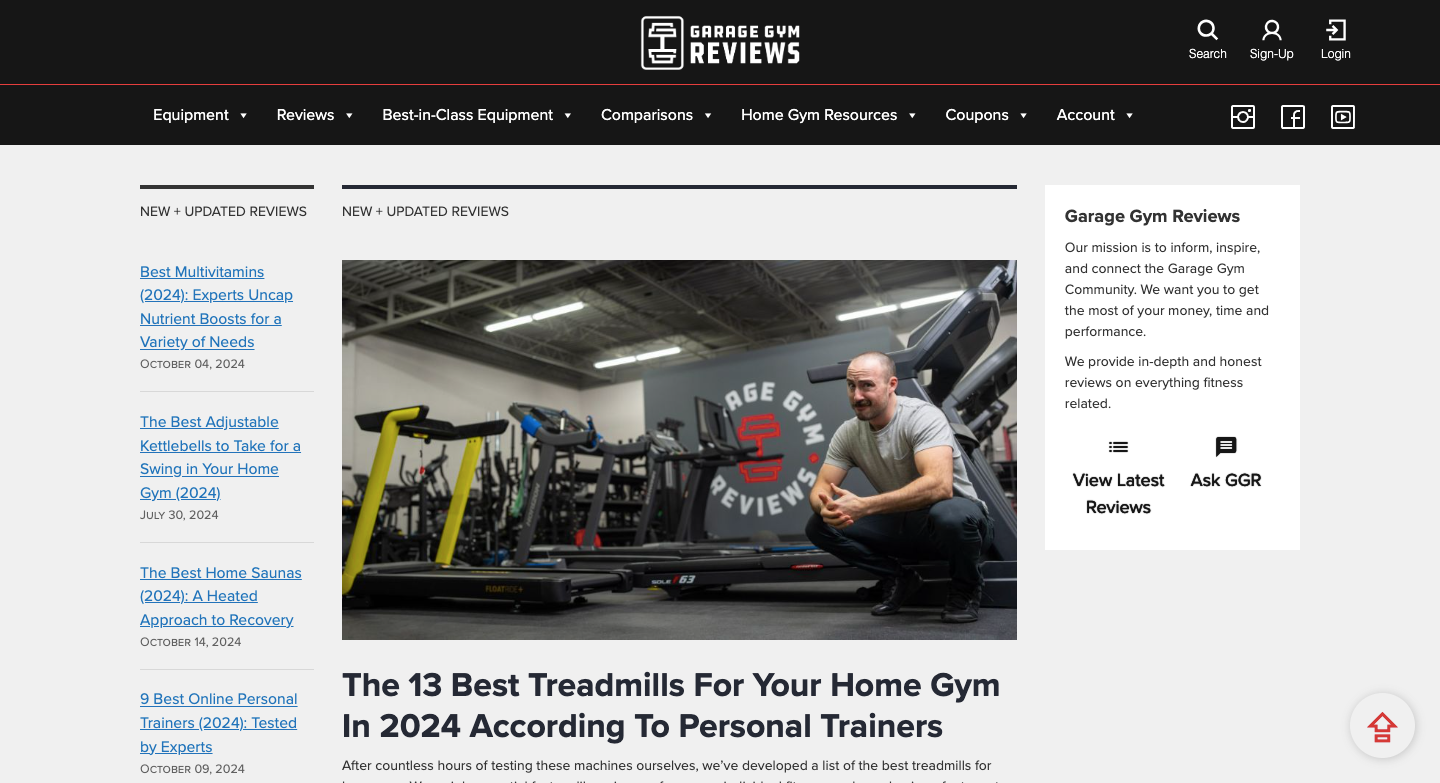
- Niche: Fitness
- Main channels: YouTube, website
Garage Gym Reviews is exactly what it sounds like: a publisher dedicated to helping people build the best home gym for their money.
It’s an excellent example of how to use two channels — YouTube and a website — to maximize your affiliate earnings. They routinely clock up 2 – 3 million video views per month on YouTube, most of which involve reviews of specific home gym equipment.
Take a look at their YouTube descriptions and you’ll notice they’re packed full of two types of links:
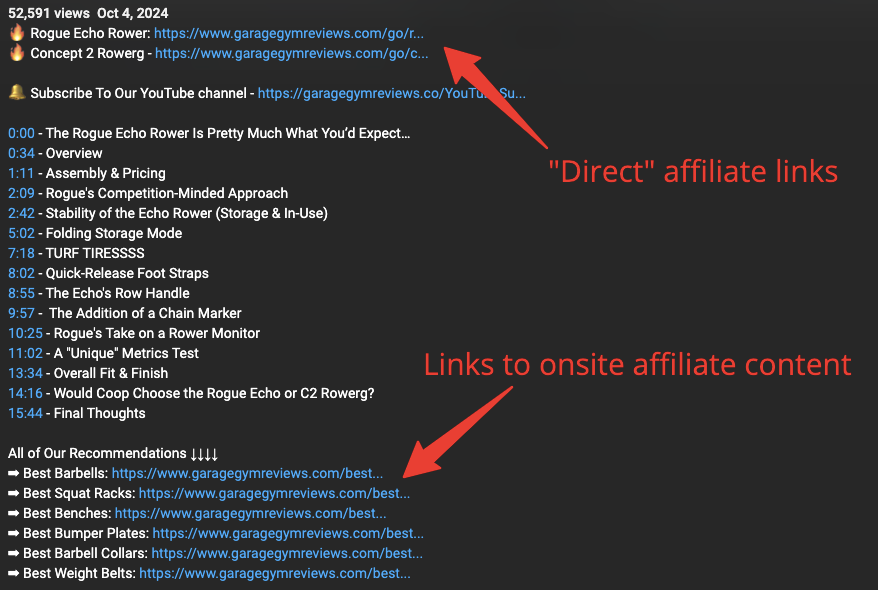
- “Direct” affiliate links send clickers straight to product pages on advertiser sites like Rogue Fitness and Concept2.
- Links to affiliate content on the Garage Gym Reviews website.
In other words, they’re using YouTube as both a traffic source and a monetization channel in its own right.
Key learning: Don’t put all your eggs in one basket when it comes to generating traffic and clicks. Algorithms are volatile — and if you rely on just one channel, a single algorithm update could tank your whole business.
2. CarterPCs
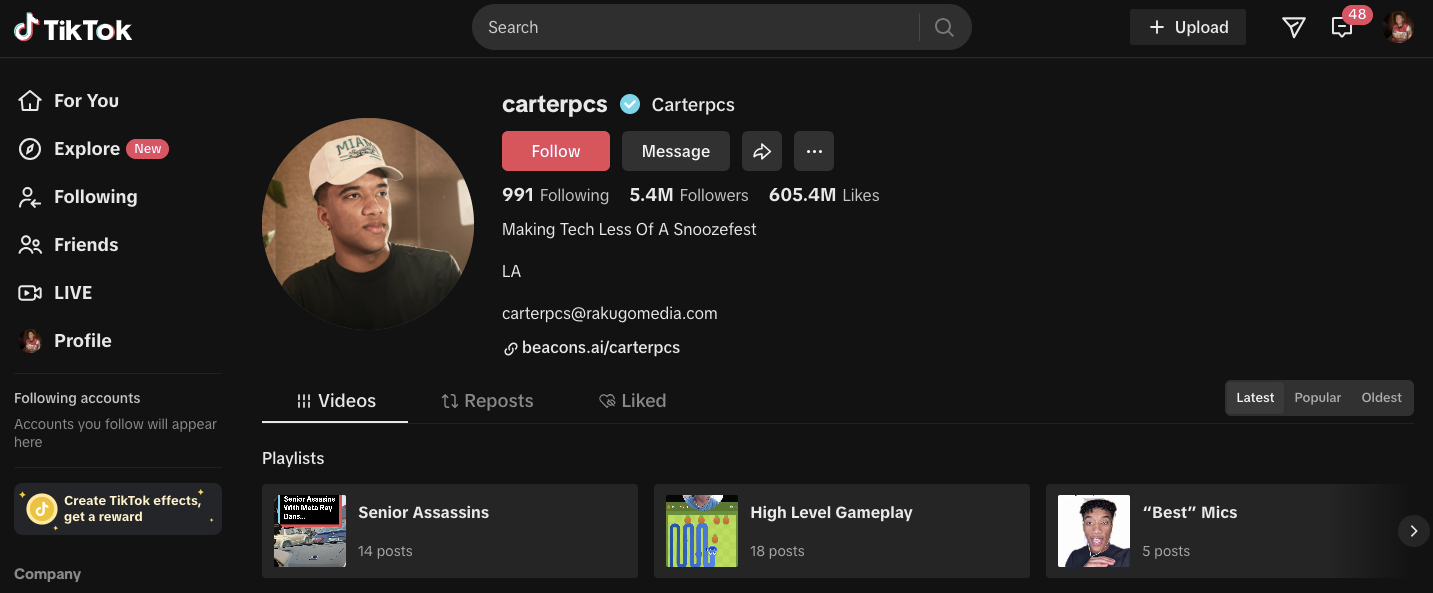
- Niche: Consumer tech
- Main channels: TikTok, YouTube
Carter Smith, the creator behind CarterPCs, has built a substantial audience on TikTok and YouTube by sharing high volumes of consumer tech-focused content. He routinely uploads 100+ TikToks a month, while his YouTube channel promises to make “consumer tech interesting, four times a day”.
But how do you turn millions of views and likes into passive income? Especially on a platform like TikTok, which doesn’t let you add links to content.
The answer is simple: link to a bridge page from your bio. When people click Carter’s bio link, they’re taken to a bridge page containing links to various other pages, including his Amazon storefront…
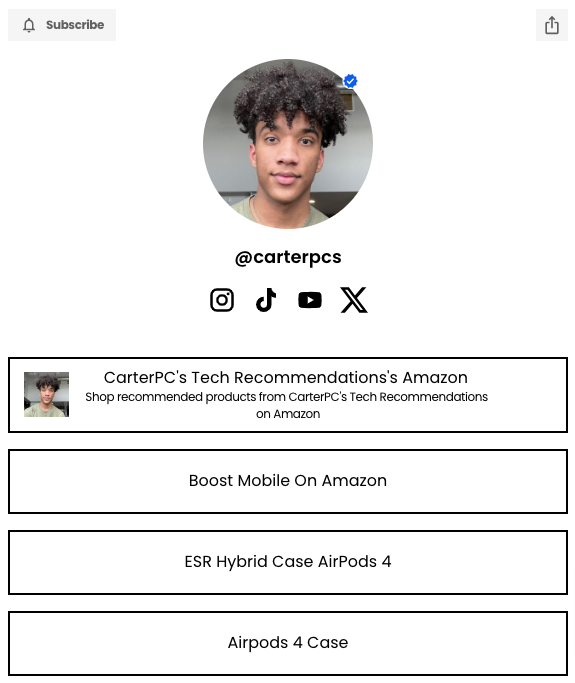
…which lists all the products he recommends in his TikTok and YouTube content.
Key learning: To create your own storefront for recommended products, you’ll need to join the Amazon Influencer Program.
How to Make Money Reviewing Amazon Products: From Amazon Associates to Shoppable Videos
3. MyGolfSpy
- Niche: Golf
- Main channels: Website, newsletter
MyGolfSpy positions itself as the world’s most extensive hub of golf gear reviews. It’s in a fiercely competitive niche filled with major specialist publishers like GOLF.com and Golf Monthly, while high-profile generalists like Forbes also target golf-themed content.
With so many big names elbowing in on its turf, MyGolfSpy can’t afford to rely on SEO to keep growing its website traffic — the SERPs are just too crowded. Instead, it uses newsletters to reach its audience through their email inbox.
As you can see, MyGolfSpy’s newsletters contain a bunch of links to their latest affiliate content:

With 200,000+ golf fanatics signed up to the newsletter, it’s clearly a major source of traffic.
Key learning: To leverage the benefits of email marketing, you need to give website visitors a compelling reason to hand over their email addresses. MyGolfSpy does this through a lead magnet that promises to help people choose the best golf ball for their game. It’s promoted via a website popup to ensure they get as many eyes on it as possible:
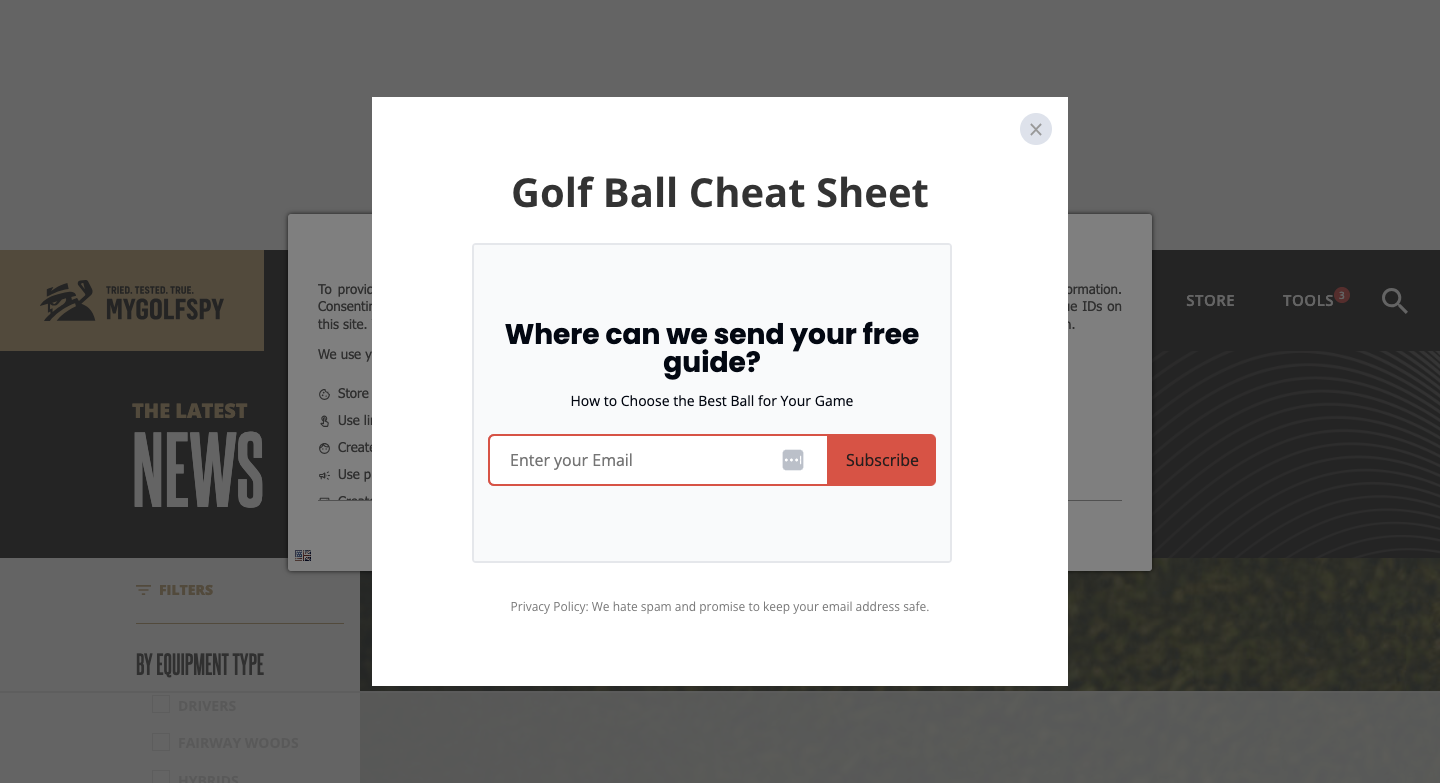
Make affiliate marketing work for you with Whop
By this point, it should be clear that affiliate marketing does work — so long as you’re ready to put the effort in.
That’s where Whop comes in.
The Whop Marketplace contains a ton of advice for anyone looking to make money online, including how to:
- Grow an affiliate business from $0 – $10,000
- Turn content creation into a sustainable career
- Build an affiliate revenue stream on TikTok
Check out the Whop Marketplace to find an affiliate marketing course or community.
Not only that, but you can boost your earnings by signing up for the Whop affiliate program and referring creators or customers to our platform.
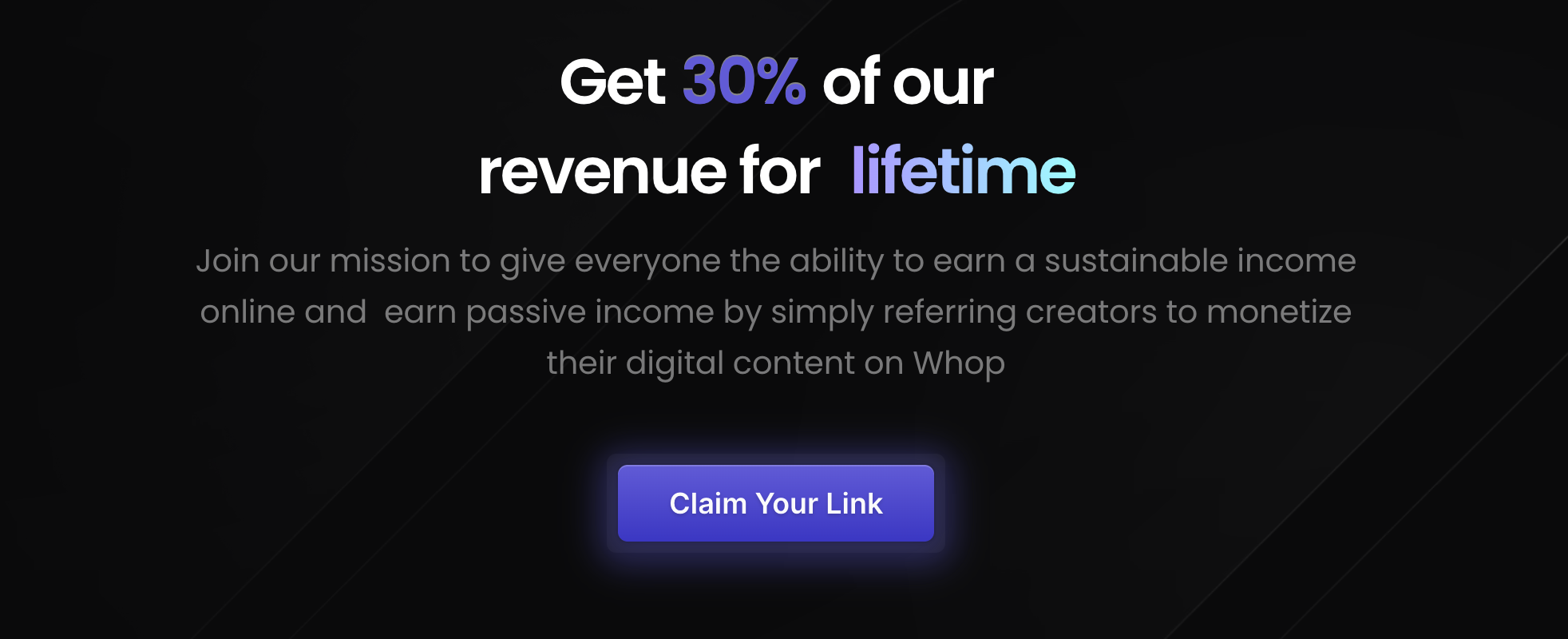
When you refer an affiliate to sell with Whop, you get 30% of Whop's revenue for life. Each time the creator makes a sale, you make money - forever.


